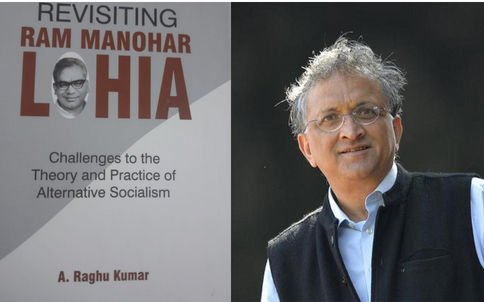“Congress, BJP and Communist parties have their historians. The Socialist have none. Young persons in their thirties and forties should take up the task of writing the history of socialists in India. It should begin in 1934 when the Socialist party was born and could end in 1990s when the party got disintegrated into a number of pieces,” said well known historian and environmentalist Ramachandra Guha. He was speaking in Hyderabad on Saturday evening, at FIIC, after releasing the book ‘Revisiting Ram manohar Lohia’ written by A. Raghu Kumar.
While the BJP or RSS people had nothing to do with independence struggle, the Communists acted as informers to the colonial rulers from 1941 to 1944, the Congressmen and Socialists fought resolutely for freedom, Guha said. He quoted Mahua Moitra of the TMC, “The BJP came closest to fighting the British when the government headed by the party got IT searches done in BBC offices in Delhi and Mumbai. Guha said Lohia was an original thinker and activist. He was the leader to be arrested so many times after independence. Lohia questioned every leader including Gandhi and Nehru. The Socialist leader said the Marxism has many inadequacies. The Socialists love the people and the country, said Guha. He remembered that Lohia was in the US on 27 May 1964 when Nehru breathed his last. Guha said Lohia was fighting against the then American government.
Earlier the author, Raghu Kumar, has introduced his book to the audience. He said he felt that even Lohia should be seen from critical angle. Whatever Lohia wrote, and he wrote copiously, need not be praised but should be studied critically. He said Lohia did not agree with the surplus theory of Marx. He felt the Communists had failed in interpreting the Marxian theory to the Indian conditions. He said he had divided his book into four parts. One, Lohia as a critic of capitalism 2. History of Class and Caste, 3. Doctrinal Foundation and 4. Lohia, a critique and a restatement. In the last chapter, he took a critical view of the works by Lohia.
K. Ramachandra Murthy, senior editor, said Lohia was a fierce fighter who managed to go to jail even during Nehru’s dispensation. While Ambedkar compared Marx with Budha, Lohia compared Gandhi with Marx, he said. While Lohia did everything that the other politicians did, he did something extra by commenting on epics. These two thinkers – Ambedkar and Lohia, recognized the role of caste in the life of the nation and both of them wrote extensively on it. In ‘Itihasa Chakkra,’ a book in Hindi, Lohia said Draupadi is the most venerable character and not Sita or Savithri. Lohia argued that Krishna (Vasudeva) and Krishna (Draupadi) are the true hero and heroine of Mahabharata, said Murthy.
Rama Shankar ji of Madhya Pradesh presided over the meeting. Rama Shankar was a minister in MP government for some time. He was elected to the Legislative Assembly. Speaking at the end of the meeting, Rama Shankar said Lohia was more honest than Nehru and even Gandhi. His (Lohia’s) opposition Hindi was not an opposition to the language but against the practice of the politicians and officials speaking in English which was at that spoken by one percent of Indians. He encouraged people to speak in their mother tongue. Rama Shankar said while Gandhi and Nehru fought against British imperialism, Lohia additionally fought for liberation of Goa from the Portuguese, Nepal from the King, he went to the US to fight against the government there and he was waging fights against the Indian government after independence. He said Lohia was the only leader who continued satyagraha form of protest after the demise of Gandhi. Lohia demanded 60 percent reservations for the underdog. He said Lohia was in favour of greater representation for women.
Gopal Singh Thakur, President of Lohia Vichar Manch, has conducted the meeting.




